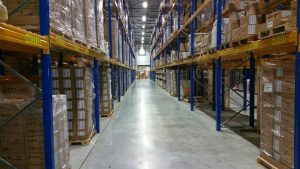The rise of Artificial Intelligence (AI) and robotics in warehousing is ushering in a new era for the logistics sector, significantly impacting various industries, notably beverage distribution. As technological advancements progress, the opportunities for improving operational efficiency, worker safety and overall quality of jobs are becoming more evident.
In the beverage industry specifically, AI and robotics are redefining the warehouse landscape. These innovations are streamlining operations, leading to higher-skilled roles and ultimately to greater job satisfaction for employees.
Raising the bar in efficiency and accuracy
AI and robotics are beginning to enhance efficiency in warehouse operations significantly. In the beverage sector, where speed and accuracy are paramount, automation technologies streamline various tasks, including order picking, sorting, packaging and inventory management. Robotic systems can handle repetitive tasks at a much faster rate than humans, while AI-driven algorithms can optimise routes and stock management. These improvements not only speed up processes but also increase the accuracy of operations, ensuring fewer errors and reducing costly mistakes. For companies in the beverage industry, this can help with more reliable service, lower operational costs and higher customer satisfaction.
Improved safety and ergonomics at work
Workplace safety is a critical concern in warehousing. Robots are now taking over many of the traditionally strenuous duties undertaken inside a warehouse, significantly reducing the risk of workplace injuries. For example, automated forklifts and robotic arms can move and stack heavy crates of beverages, minimising physical strain on employees. This shift allows workers to focus on less physically taxing and more intellectually engaging tasks. The result is a safer working environment where the risks associated with repetitive strain, heavy lifting and hazardous conditions are drastically reduced.
Better job quality and higher-value roles
One of the most common misconceptions and people’s fear about AI and robotics is that they lead to job losses. In fact, these technologies are creating a new set of opportunities for workers. Rather than eliminating positions, AI and robotics are freeing up employees from monotonous, repetitive tasks, allowing them to engage in more valuable roles. With the automation of physical tasks, warehouse workers can focus on higher-value activities such as quality control, system monitoring, exception management and decision-making.
The introduction of these new technologies is, in fact, leading to the creation of a range of more skilled positions within the warehouse. These roles include robotics technicians, AI system analysts, data analysts and engineers, all of which require higher levels of technical expertise.

Helping the beverage sector reduce environmental footprint
Beyond improving operational efficiency, AI and robotics are also helping warehouses in the beverage sector reduce their environmental footprint. These technologies allow for better inventory management, reducing waste by ensuring products are stored and moved in the most efficient manner possible and are not even lost in the system, resulting in missed sales. AI can predict demand patterns and optimise stock levels, minimising overordering and spoilage.
In addition, automated systems can reduce energy consumption by improving the efficiency of machinery and lighting. This results in both cost savings for the business and a smaller environmental impact, contributing to more sustainable warehouse operations. Helping Scope 3 emissions reductions.
Integrating AI and robotics in warehousing presents a significant opportunity for the beverage sector to enhance operational efficiency and worker safety and reduce its environmental impact, both in direct and indirect emissions.

By automating repetitive and physically demanding tasks, companies will not only be improving the accuracy and speed of their operations and environmental impact but also enabling their workforce to transition into more skilled and stimulating roles. As these technologies continue to evolve, the future of warehousing in the beverage sector looks promising, with significant benefits for both businesses and employees.
Looking at the present and future, it is unmistakable that AI and robotics are transforming the logistics sector. By utilising predictive analytics, advanced robotic systems and seamless integration, we are experiencing a significant increase in efficiency, accuracy and adaptability in operations.
Moreover, in the Autumn Budget of November 2024, the Government unveiled an ambitious Artificial Intelligence Opportunities Action Plan, a blueprint designed to seize the transformative potential of AI for boosting growth and productivity. This initiative prioritises the swift adoption of AI across multiple sectors, aiming to enhance services and stimulate economic expansion.

